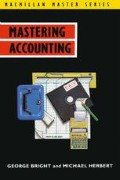Abstract
So far you have studied various aspects of the accounts of sole traders, partnerships and limited companies — different types of ownership of businesses. All of these have been involved in trading, i.e. the buying and selling of finished goods, as their method of operation. This type of business activity is very common and familiar to us all when shopping, whether it be at the local newsagent’s, supermarket or large store. However, other firms have to supply the goods which these traders sell. Many of Britain’s largest and best known companies, such as GEC, ICI, Rover Group, Plessey, BP and Unilever, are mainly involved in this different business activity of manufacturing goods and then selling them. Overall, manufacturing firms account for approximately 20% of people employed and so constitute an important sector of the economy. The main characteristic of such manufacturing firms is that they obtain raw materials and components and convert them into finished products ready for sale. This work will obviously be reflected in the accounts which will, therefore, be slightly different to those which you have previously seen and prepared.
Preview
Unable to display preview. Download preview PDF.
Copyright information
© 1990 George Bright and Michael Herbert
About this chapter
Cite this chapter
Bright, G., Herbert, M. (1990). Manufacturing Accounts. In: Mastering Accounting. Macmillan Master Series. Palgrave, London. https://doi.org/10.1007/978-1-349-20618-6_14
Download citation
DOI: https://doi.org/10.1007/978-1-349-20618-6_14
Publisher Name: Palgrave, London
Print ISBN: 978-0-333-51198-5
Online ISBN: 978-1-349-20618-6
eBook Packages: Palgrave Business & Management CollectionBusiness and Management (R0)

